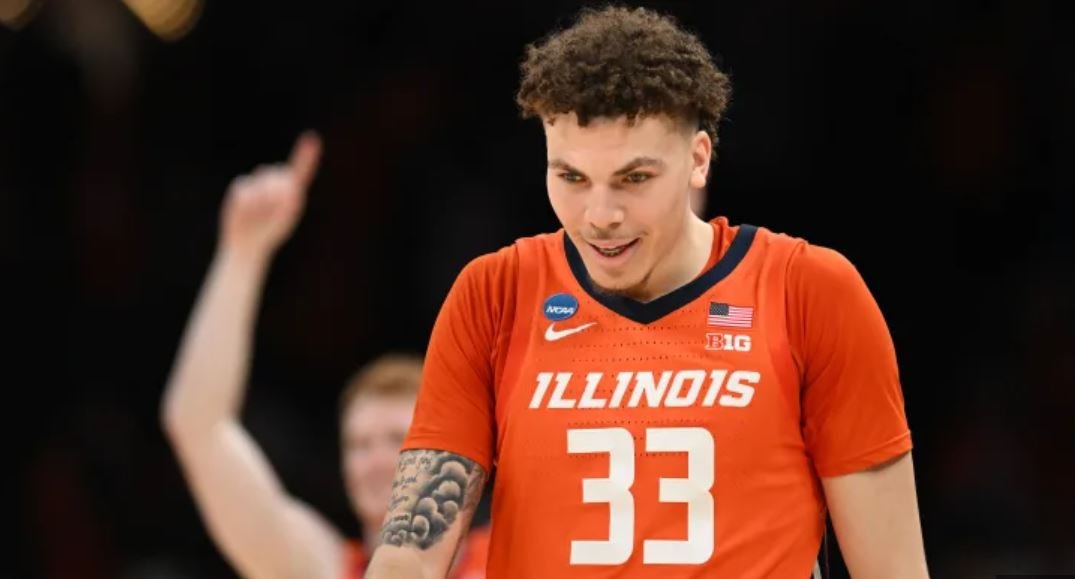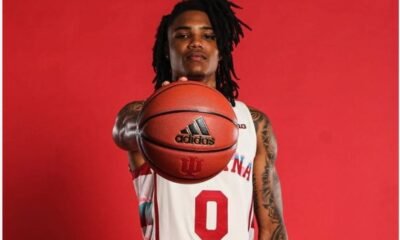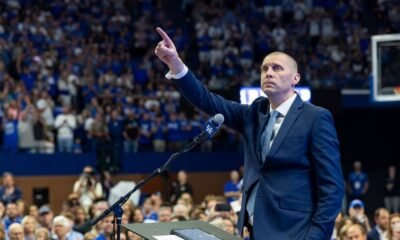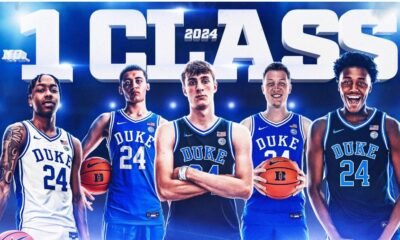NCAA BK
Fighting Illini Basketball Athlete Coleman Hawkins Voices Discontent with College Program Ahead of Departure.

In a surprising turn of events, Coleman Hawkins, a standout forward for the Illinois Fighting Illini basketball team, has voiced his discontent with the college program, indicating his intention to depart. This development has stirred significant discussion among fans, analysts, and the broader college basketball community, shedding light on the challenges and complexities of collegiate athletics.
Coleman Hawkins has been a vital player for the Illinois Fighting Illini, known for his versatility, defensive prowess, and ability to stretch the floor with his shooting. Since joining the team, Hawkins has made significant contributions, helping the Illini achieve notable successes in the Big Ten Conference and earning individual accolades along the way. His departure signals a major shift for the program and raises questions about the underlying issues that prompted his decision.
Reasons for Discontent
Hawkins’ dissatisfaction with the Illinois basketball program appears to stem from several key factors:
- Coaching and Management: One of the primary sources of Hawkins’ frustration is related to coaching and management decisions. He has reportedly felt that his role on the team has been mismanaged, with inconsistent playing time and unclear communication regarding his position and responsibilities. This has led to a sense of underutilization and a lack of trust in the coaching staff’s vision for his development.
- Team Dynamics and Culture: Another significant issue is the team dynamics and culture within the program. Hawkins has expressed concerns about the locker room environment, suggesting that there has been a lack of cohesion and support among players. This kind of environment can be detrimental to team morale and individual performance, leading to a sense of isolation and dissatisfaction.
- Program Direction and Goals: Hawkins has also voiced his discontent with the overall direction and goals of the Illinois basketball program. He believes that the program has not made the necessary strides to compete at the highest level, despite having the talent and resources to do so. This perceived lack of ambition and strategic planning has contributed to his decision to seek opportunities elsewhere.
Impact on the Illinois Basketball Program
Hawkins’ departure will undoubtedly have a significant impact on the Illinois basketball program. As a key player, his absence will be felt both on and off the court. Here are some of the potential implications:
- On-Court Performance: Hawkins’ versatility and skill set have been crucial to the Illini’s game plan. His ability to defend multiple positions, rebound effectively, and contribute offensively will be challenging to replace. The team will need to find ways to fill the void left by his departure, which may involve adjusting their strategies and relying more heavily on other players.
- Recruitment and Retention: The departure of a high-profile player like Hawkins can affect the program’s ability to recruit and retain top talent. Prospective recruits may view his decision as a sign of deeper issues within the program, leading them to consider other options. Additionally, current players may reassess their own situations and consider transferring if they share similar concerns.
- Program Reputation: Publicly voicing discontent can have repercussions for the program’s reputation. The Illinois basketball program may face increased scrutiny from the media, alumni, and fans, who will demand accountability and solutions to the problems highlighted by Hawkins. The coaching staff and administration will need to address these issues proactively to restore confidence and stability.
The Broader Context of Collegiate Athletics
Hawkins’ situation highlights broader challenges within collegiate athletics, where student-athletes often navigate complex dynamics involving coaching, team culture, and program expectations. The following points offer a deeper understanding of these challenges:
- Student-Athlete Experience: Balancing academic commitments, athletic responsibilities, and personal well-being is a demanding task for student-athletes. Ensuring that they receive adequate support and clear communication from coaching staff is essential for their development and satisfaction.
- Transfer Portal Dynamics: The NCAA transfer portal has become a critical tool for student-athletes seeking new opportunities. Hawkins’ decision to potentially enter the transfer portal underscores the importance of flexibility and autonomy for athletes in choosing environments that best suit their needs and goals.
- Program Accountability: Programs must be held accountable for creating positive and supportive environments for their athletes. This includes fostering healthy team dynamics, providing transparent communication, and aligning the program’s goals with the aspirations of its players.
Moving Forward
For Coleman Hawkins, the focus will now shift to identifying the next steps in his basketball career. Whether he chooses to transfer to another college program or explore professional opportunities, his future will be closely watched by fans and scouts alike.
For the Illinois basketball program, Hawkins’ departure serves as a wake-up call. The coaching staff and administration must take this opportunity to reflect on the issues raised, implement necessary changes, and rebuild trust with their players. This may involve:
- Enhanced Communication: Establishing clearer lines of communication between coaches and players to ensure that everyone is on the same page regarding roles, expectations, and development plans.
- Team-Building Initiatives: Investing in team-building activities and fostering a more cohesive and supportive locker room culture to enhance team dynamics and morale.
- Strategic Planning: Reassessing the program’s long-term goals and strategies to ensure that they align with the aspirations of both the players and the broader university community.
Coleman Hawkins’ decision to voice his discontent and potentially depart from the Illinois basketball program is a significant event that highlights underlying issues within the team. While his departure will undoubtedly impact the Illini, it also presents an opportunity for the program to address these concerns, improve the student-athlete experience, and build a stronger, more cohesive team moving forward. As Hawkins embarks on the next chapter of his career, the lessons learned from this situation will resonate within collegiate athletics, emphasizing the importance of communication, support, and strategic alignment in fostering successful athletic programs.
-

 NFL2 months ago
NFL2 months agoBREAKING: Steelers Best Quarterback Suspended for 6-Months Due to…
-

 NCAA1 month ago
NCAA1 month agoI am No Longer Comfortable at Illinois Fighting Illini, Quarterback Cal Swanson Cries Out…
-

 NFL2 months ago
NFL2 months agoJust In: Unexpected Name Surfaces in Rumors for Steelers Coaching Position.
-

 NFL2 months ago
NFL2 months agoRaheem Morris threaten to leave Atlanta Falcons if the Owners fails to….
-

 NFL2 months ago
NFL2 months agoGiants QB Daniel Jones to Undergo 12-Months Suspension After He was Found to be…
-

 NHL2 weeks ago
NHL2 weeks agoMinnesota Wild Veteran Player Announces Plan to Leave Team, Cites Poor Management…
-

 NBA2 months ago
NBA2 months agoBREAKING NEWS: LeBron James Has Agreed to Extend His Current Contract at Lakers worth $147.7 millions till…
-

 NBA2 months ago
NBA2 months agoT.J Watts of Steelers Discusses His Departure After a Close Door Meeting with…












